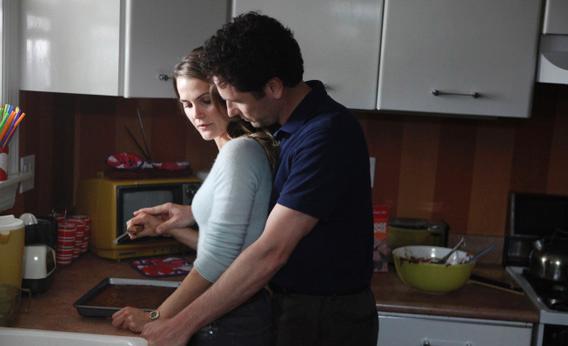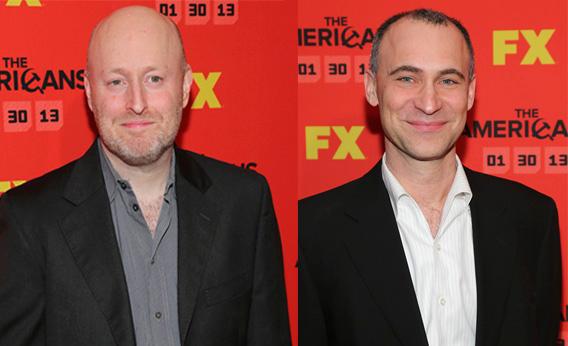In The Americans, the new FX series that premiered Wednesday night, Keri Russell and Matthew Rhys play Elizabeth and Philip Jennings, two wholesome residents of an all-American suburb of Washington, D.C., circa 1981. But behind the facade of domestic drama, The Americans is an entirely different kind of show: The Jenningses are deep-cover KGB agents at the height of the Cold War. The series was created by Joseph Weisberg, who worked in the CIA’s directorate of operations from 1990 to 1994.
Slate talked with Weisberg (who is also the brother of Jacob Weisberg, the Slate Group’s editor in chief) and his fellow writer, executive producer, and showrunner Joel Fields about authenticity, history, and making viewers fall in love with murderous Russian spies.
Slate: Unlike any other espionage drama that I’m aware of on TV, this series was created by a former spy. I hear that Joe plays the “spy card” when he feels that real spies wouldn’t do something the other writers are suggesting for the characters. Do you worry that viewers aren’t used to accurate portrayals of the spy world?
Joe Weisberg: I used to worry about that, but now I only worry about the other writers in the room mocking me. People are used to things they’ve seen on TV. If you showed the way things really work, it would be boring. Like police and war, so much of this work is just sitting around, punctuated by moments of extreme violence.
Joel Fields: There was a great day before we started shooting when Joe sat us down—the writers, Adam Arkin our producer/director, and actors Keri, Matthew, and Noah Emmerich—and took a half-hour with a white board explaining surveillance to us, teaching us how to know if you’re being followed when you’re driving a car, without anyone knowing you’re looking. And then we all went outside and got to practice traffic surveillance.
Weisberg: I had a great ulterior motive. The only way they would stop mocking me about the spy card is if I gave them spy cards. But coming up in our third episode, we have a surveillance sequence that, for my money, is done more accurately and in a more interesting way than any surveillance sequence I’ve seen before.
Slate: Are there any other areas, other than surveillance, where you feel you had more realism than the typical TV/movie version of the spy world?
Weisberg: General tradecraft stuff. What we call communications, which is using signals to contact each other. Dead drops and the way agents are run and handled. A lot of what you see of spies in TV and movies has to do with blowing things up. In the real world, there’s a lot more recruiting and handling and running agents—which is all about relationships and human drama, which lends itself very well to a television show.

Photo by Craig Blankenhorn/FX
Slate: Homeland faced a backlash in Season 2 around realism and credibility. Is your show a response to Homeland’s having lost track of the real world?
Weisberg: I twist myself up in knots thinking about that. In a way, it’s all about what feels real, what you accept as real. I read a lot of criticism of Homeland where people said, “How would she ever be able to get to walk around headquarters when she’s just a visitor?” I worked at headquarters for four years, and I was leading the charge. I was outraged. And then at one point, I remembered, “You know what? There was a special badge for visitors who don’t need an escort. And Carrie would be someone who maybe would have been given one of those badges. Actually, crazily enough, that might be realistic.” But it doesn’t matter that I know that, because it seems totally unrealistic.
What matters is how it feels. John le Carré says he doesn’t strive for realism, he strives for authenticity, which he defines as what feels authentic. He fully accepts that his novels are not in the least bit realistic, but he tries to make them feel real. You make your own choice—are you going to suspend disbelief or not? I willingly and happily suspend disbelief. I love Homeland.
Slate: I’m fascinated by Philip and Elizabeth’s relationship. I wonder if the biggest challenge to their survival will come from outside—from the FBI—or from inside their marriage.
Fields: The Americans is at its core a marriage story. International relations is just an allegory for the human relations. Sometimes, when you’re struggling in your marriage or with your kid, it feels like life or death. For Philip and Elizabeth, it often is.
Slate: In Episode 2, the story revolves around an event in the life of Defense Secretary Caspar Weinberger, and a meeting with his British counterpart, John Nott. That made me ask myself, “Did that really happen?” Are you trying to get viewers to question the official version of the Reagan ’80s?
Fields: The show works on different levels of reality. There’s the fictional world of Philip and Elizabeth, their marriage, and their life. There’s the real world of what happened during the Cold War. And then there’s this hazy in-between world. So, for example, Caspar Weinberger was a real person. The show is speculating what nobody can know, which is what was going on in the secret world of the KGB at that time. Could they have possibly tried to put a bug in his home, and if they did, what would they have done with that information? Who knows?
There are times when we take leaps, but they’re careful leaps. For example, in Episode 4, the Reagan assassination episode, the Jenningses go back and listen to some things off that bug. Now, we don’t know for sure that the KGB did that. However, we do know that there were tapes made of the White House Situation Room that day, and we used sections of those tapes in the bug that Philip and Elizabeth listen to. The question becomes what would they have done had they heard what actually happened? Among the things we found out in our research of that day was that Al Haig not only went on television and said, “I’m in control here,” but he also requested, and received, a copy of the nuclear football—the briefcase with the missile launch codes. So that episode asks what would these two spies do in the tension and fog of that day if they had that information.
Slate: You do some tricky things with viewers’ sympathies. In the first couple of episodes, it felt to me that Philip and Elizabeth were the more likable, sympathetic characters—even though they were working to undermine my country. Stan Beeman, the FBI man, felt less sympathetic, because his motivations and ideology were less clear, at least at the beginning. You made me identify with the Russian spies!
Weisberg: In the early days we used to worry: Will we be able to get people to sympathize with KGB officers? Then we cast Keri and Matthew and started watching, and that question evaporated, because they were so likable and sympathetic that we stopped worrying about it. Then we started writing the stories, and they do some terrible things, so we started worrying about it again.
Fields: What we have are these two characters who are fighting for their country. They’re fighting for a system that they believe in. But in 2013 we all know that repressive socialism was an utter failure. We know that system is not going to work.
Slate: Joe, your second novel, An Ordinary Spy, was set in the CIA, and you played around with censorship and how the CIA has to approve anything written by former agents. Did you also have to run The Americans by the agency?
Weisberg: Any script I write has to be submitted to the Publications Review Board at the CIA. They ask for a month, and we don’t really have that much time, so I send them in with what’s called a request to expedite. I always feel a little bad about it: “Dear Publications Review Board, here I am again asking for the expedited review …” There haven’t been any occasions yet where they’ve asked me to take anything out of a script, which is what I expected, because I haven’t worked there for a number of years at this point. I still worry a little bit, though. Before giving the demonstration of surveillance techniques, I had to submit a request ahead of time, but that was approved also. Joel’s scripts go in, too, if we write them together.
Slate: So any script that has your name on it has to be reviewed by the agency?
Weisberg: That’s right.
Slate: There are certain similarities between the work of a CIA agent and a TV writer. They both deal with deception, misdirection, recruitment—albeit of viewers rather than assets—and loyalty-building. Are you aware of taking the skills you developed in one job and applying them to the other?
Weisberg: That had never occurred to me, but Joel is nodding his head.
Fields: But Joe swears that the hours were much better in the CIA.
Weisberg: It’s true, it was 9 to 5.
This interview has been edited and condensed.
